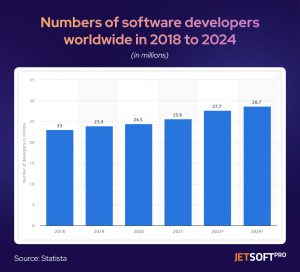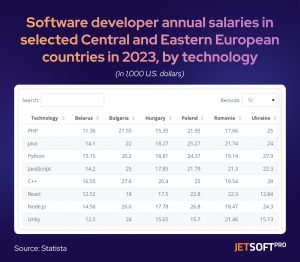As of March 6, 2024, the average hourly wage for Software Developer services in the United States stands at $53.77. However, the median software developer salaries aren’t very indicative: depending on the technology and level of experience, the salary range can be significant.

In 2023, Zig and Erlang were the programming languages associated with the highest salaries worldwide. An average Zig developer in the US earns $60 per hour.
When it comes to outsourcing markets in Asia, the average hourly rate in India is $3.87, while in the Philippines it’s $6.67. European developers, on average, charge between $25 and $40 per hour (Poland and Ukraine being examples).

The global revenue in the IT Outsourcing segment of the IT services market was projected to increase continuously between 2024 and 2028, reaching a total of USD 265.3 billion, marking a 51.77 percent increase. After eight consecutive years of growth, it is estimated to reach USD 777.74 billion, reaching a new peak in 2028.
Similarly, the global revenue in the IT Consulting & Implementation segment of the IT services market was expected to increase by a total of USD 14.7 billion (+20.32 %) between 2024 and 2028. After eight consecutive years of growth, it is estimated to reach USD 87.03 billion, reaching a new peak in 2028.
Meanwhile, since the advent of ChatGPT, the entire technological world has been discussing when we can dispense with human programmers and entrust coding to robots and neural networks. Furthermore, the market anticipates a decrease in software developer salaries, as there is expected very little work left for them with the use of AI.
Read: Technology market layoffs: figures, facts, volumes
Recently, the American company Cognition introduced a robot capable of performing a programmer’s tasks throughout the development cycle. Let’s delve into when software developer salaries might decrease and outsourcing becomes more accessible.
Why do software developer salaries vary so much?
Several factors can lead to different salaries for programmers, even if they work with the same technology. Here are some of them:
- Experience and seniority. Programmers with higher levels of experience can complete tasks faster and with higher quality, impacting team productivity and therefore project profitability. You pay more to someone who brings you more money, don’t you?
- Countries with high and low living standards. Depending on the location, the cost of labor can vary significantly. When you seek a balance between cost and quality, don’t forget to consider the cultural context.
- Big companies have spoiled the market. For large companies, especially tech giants, attracting highly skilled specialists is important for maintaining competitiveness in the market. They may offer higher salaries to attract and retain talented programmers. Of course, employees quickly get used to high salaries and refuse to lower the bar.
- Specialized education. Programmers with education and certifications usually cost more, as they typically have deeper knowledge and professional skills.
- Managerial skills. Programmers with good communication skills and the ability to effectively lead projects or teams can be a valuable asset to a business, and of course, they cost more.
Can we simply hire a software developer with a lower salary?
When outsourcing to cheaper markets, various risks arise that can affect your project. Firstly, the quality of work may be lower than expected due to a lack of professionalism or low qualifications of workers. This will lead to delays in project completion and you will have to rework the entire task.
Additionally, cultural differences can cause misunderstandings or conflicts in communication between your company and the outsourcing team. This can slow down the work process and hinder achieving desired results.
Think about this: can a team effectively pursue the same goal and deliver consistent values to the project, if in the team, figuratively speaking, one is accustomed to sleeping on one of their yachts, while another sleeps under the stars on a cot? The greater the disparity in living standards (and, of course, software developer salary), the more challenging it becomes to interact effectively.
Read: Managing technical debt in software development
Another risk is the possibility of leakage of confidential information or intellectual property due to less stringent legal and security measures adopted in cheaper markets. Thus, when choosing outsourcing in cheaper markets, it is necessary to carefully weigh all risks and take measures to minimize them.
Will software developer salaries go down in 2024?
Is it worth expecting that software developer salary will decrease by the end of 2024? The technological boom says “yes,” but there are still questions and clarifications in reality. If the IT market maintains its growth momentum and demand for qualified specialists remains high, the likelihood of programmers accepting lower salaries is low. If the economic situation becomes unstable due to new inventions or the job market experiences a downturn (which is unlikely as the recession is ending), programmers may lower their rates. However, expecting significant cheapening is not advisable. On the other hand, there is a clear trend towards reducing team sizes. For example, to develop a project in 2024, companies are hiring 1-2 fewer people in a team of 10.
There is also a dark side to reducing teams. By refusing to raise and educate Junior Developers in another project, the market may face a significant shortage of talent in the next years. Programming, like medicine, requires a long internship, you know.

